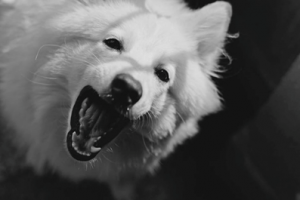
Q: Why my dog barks?
Barking is one of many forms of vocal communication for dogs.
But if your dog barks constantly, it can damage its relationship with you or your neighbours. Listen for barking that has a clear reason. For instance, perhaps your dog is barking because someone knocked on the door, or because they hear another dog barking outside. But if your dog starts barking without any apparent cause, and continues to do so for many minutes on end, take action to identify the issue and modify the behaviour.
Common causes of barking
Attention/Demand: Your dog may want to eat, go outside, or your undivided attention.
Boredom/Frustration: Your dog may be bored and frustrated if left outside for a prolonged period, or confined to one room for a long period of time.
Fear: Your dog may be afraid of objects, people, places, other animals, or loud noises such as thunder and fireworks. Your dog’s posture can tell you if he’s barking out of fear. Typically his ears are back, and his tail is held low.
Territoriality/Protectiveness: Your dog is barking in the presence of “intruders,” which may include people and other dogs in adjacent yards. If your dog is being territorial, his posture appears threatening with his tail held high and his ears up and forward.
Compulsive Barking
Some dogs bark excessively in a repetitive way, like a broken record. These dogs often move repetitively as well. For example, a dog that is compulsively barking might run back and forth along the fence in his yard or pace in his home.
Separation-Anxiety Barking
As signs are typically present when your dog is alone, using a video camera to record your dog’s activities can be very helpful in documenting the signs of distress that are diagnostic of this condition.
Playfulness/Excitement: Your dog may be overly playful and excited when greeting people.
Health Issues: Your dog may have Canine Cognitive Dysfunction (dementia) associated with old age or deafness, causing him to bark because he’s unable to hear himself bark. Be patient with your dog. Keep his environment simple and orderly; don’t make frequent changes. Talk to your vet about medications that may help the dementia. Teach your deaf dog the “quiet” command using hand signals or a flash of light or a vibrating collar (NOT a shock collar) as the cue instead of saying the word “quiet.”
Q: What can I do to stop my dog excessive barking?
Here’s a list of six techniques that can help stop your dog from barking. While all of them can be very successful, you shouldn’t expect miraculous results overnight. The longer your dog has been practising the barking behaviour, the longer it will take for him to change his ways.
Always remember to keep these tips in mind while training:
Don’t yell at your dog to be quiet—it just sounds like you’re barking along with him.
Click below to read more.

Q: Anything else need to be aware to deal with dog excessive barking?
- Do not encourage your dog to bark at sounds, such as pedestrians or dogs passing by your home, birds outside the window, children playing in the street and car doors slamming, by saying “Who’s there?” or getting up and looking out the windows.
- Do not punish your dog for barking at certain sounds, like car doors slamming and kids playing in the street, but then encourage him to bark at other sounds, like people at the door. You must be consistent!
- Unless a Certified Applied Animal Behaviourist or veterinary behaviourist advises you to do otherwise, never use punishment procedures if your dog is barking out of fear or anxiety. This could make him feel worse and, as a result, his barking might increase.
- Never use a muzzle to keep your dog quiet for long periods of time or when you’re not actively supervising him. Dogs can’t eat, drink or pant to cool themselves while wearing muzzles, so making your dog wear one for long periods of time would be inhumane.
- Never tie your dog’s muzzle closed with rope, cord, rubber bands or anything else. Doing this is dangerous, painful and inhumane.
